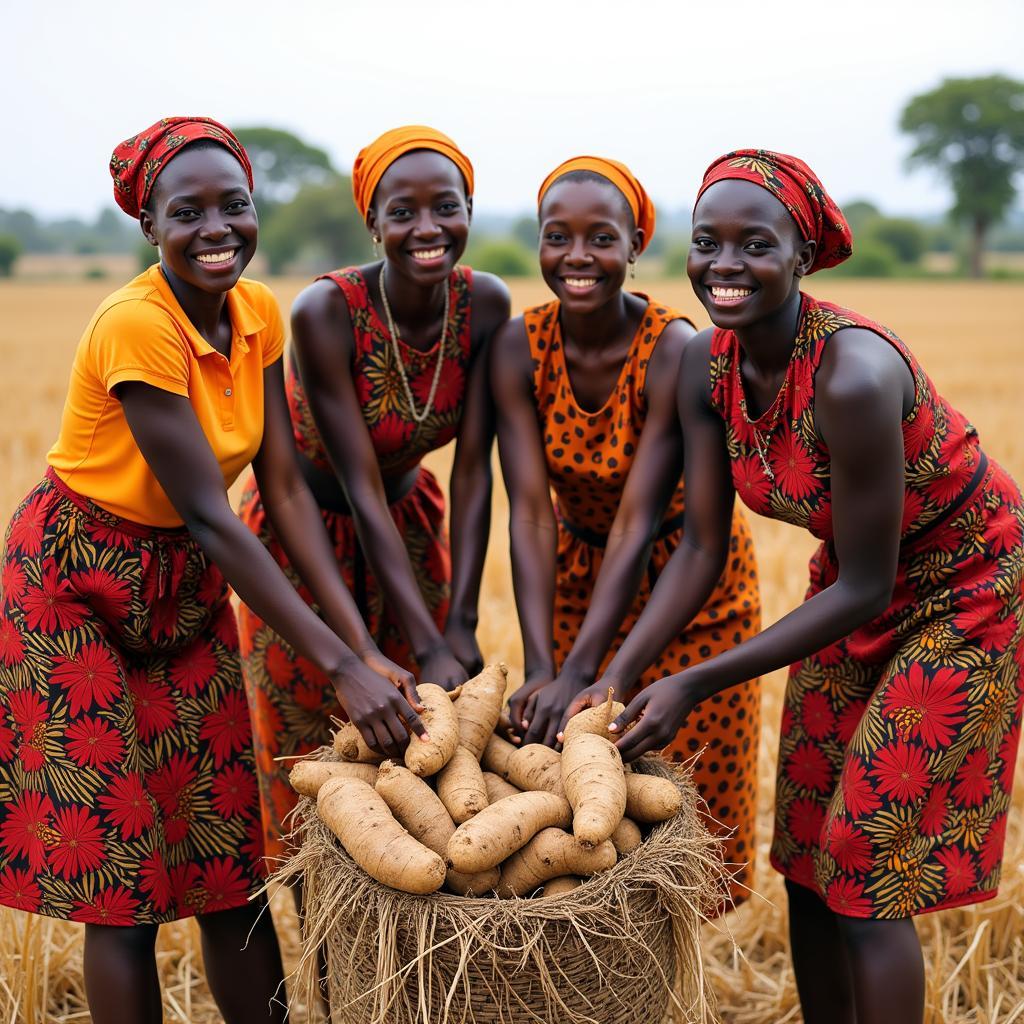About African Tribal Fruit Casava: A Staple Food with a Rich History
Casava, a starchy root vegetable, holds a significant place in the heart of African cuisine and culture. Often referred to as the “king of carbs” in certain regions, cassava is a staple food for millions across the continent, particularly in tribal communities. This article delves into the fascinating world of cassava, exploring its history, cultivation, nutritional value, and cultural significance in Africa.
 Women Harvesting Cassava in a Rural African Village
Women Harvesting Cassava in a Rural African Village
A Journey Through Time: The Origins and Spread of Casava
While the exact origins of cassava remain a subject of debate among historians, evidence suggests its domestication first took place in South America, possibly in Brazil or parts of the Amazon Basin, over 10,000 years ago. Portuguese traders introduced cassava to Africa in the 16th century, and it quickly adapted to the diverse African climates, thriving in both humid and arid regions.
Cassava in Tribal Life: More Than Just Food
Cassava’s resilience in challenging environments has made it a lifeline for many African tribes. It’s drought-tolerant nature and ability to grow in poor soil conditions have cemented its importance as a reliable food source, especially in times of famine or during seasonal food shortages.
Beyond sustenance, cassava features prominently in various cultural practices. In some tribes, it plays a crucial role in ceremonies, rituals, and traditional medicine. Cassava leaves are also consumed as a vegetable, providing essential vitamins and minerals.
From Root to Table: A Multitude of Culinary Uses
The versatility of cassava extends to its culinary applications. The starchy roots can be boiled, fried, roasted, or ground into flour. Across Africa, you’ll find a fascinating array of cassava-based dishes, each reflecting the unique flavors and traditions of the region.
- Fufu: A dough-like staple made from boiled and pounded cassava, commonly served with soups and stews in West Africa.
- Garri: A granular flour made from fermented and roasted cassava, popular in Nigeria and other West African countries.
- Cassava Bread: A flatbread made from cassava flour, often eaten for breakfast or as a snack.
- Cassava Chips: Thinly sliced and deep-fried cassava, a popular street food in many parts of Africa.
 African Family Sharing a Meal with Cassava Dishes
African Family Sharing a Meal with Cassava Dishes
The Nutritional Powerhouse: Cassava’s Health Benefits
Cassava is an excellent source of carbohydrates, providing energy for daily activities. It is also a good source of dietary fiber, which aids digestion. Additionally, cassava contains essential vitamins and minerals such as:
- Vitamin C: Supports the immune system and promotes healthy skin.
- Thiamine (Vitamin B1): Essential for energy production and nerve function.
- Riboflavin (Vitamin B2): Important for cell growth and function.
- Manganese: Contributes to bone health and metabolism.
A Sustainable Future: Cassava’s Potential in Africa
As we look to the future, cassava’s importance in Africa continues to grow. Its hardiness and adaptability make it a key player in ensuring food security, especially in the face of climate change. Furthermore, cassava’s diverse applications, beyond food, offer promising opportunities for economic development. From its use in animal feed and biofuel production to its potential in the manufacturing of biodegradable packaging, cassava’s potential seems boundless.
In conclusion, cassava’s journey from a South American plant to an African staple is a testament to its resilience and the ingenuity of those who embraced it. More than just food, cassava embodies the spirit of resourcefulness, cultural diversity, and a promising future for Africa.


